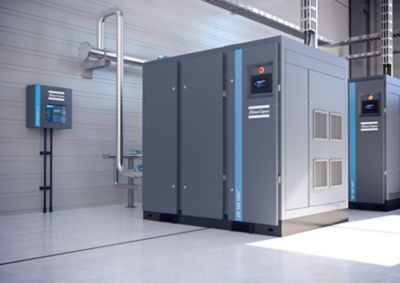Did you know that the ideal operating temperature for a compressed air generation system is typically between 39 and 95 degrees? This means that the freezing temperatures of winter can have a significant impact on your compressed air system, especially if the ambient temperatures in your compressor room fall below this range. It's time to examine what the well-known phrase "Winter is coming" means for your compressed air generation system!
How will the cold temperatures affect my compressed air generation system?
Lowest winter temperatures can cause both short- and long-term damage to your compressed air generation system. A key example is frozen condensate which can clog/rupture critical components within the larger compressed air generation system. Other components such as control lines, drain valves, compressed air filters and heat exchangers are also at risk of freezing and cracking. Other possible damage caused by cold ambient temperatures of your compressed air generation system are:
❄ Compressor does not turn on. Do you have a screw compressor that can no longer be switched on when it is cold? There is a good chance that this is due to the low ambient limit switch (which many screw compressors are fitted with) which prevents the compressed air production plant from starting when the ambient conditions are below 32 degrees Farenheit (°F).
❄ The compressor oil becomes thicker. The colder the temperatures, the thicker the oil! The thicker the compressor oil, the lower the lubricity, which in turn means that more energy is required to run the compressed air generation system. Keep this in mind - engine life can be reduced if this continues for a long period of time.
❄ Refrigeration dryers work too efficiently. There is a risk with refrigeration dryers that they will work too well in winter conditions; if the compressed air is dehumidified, it can freeze and damage the larger drying system.
❄ Reduced drying capacity in compressed air dryers . Wet supply air can freeze in the compressed air dryer pipes and cause the tower switching valves to malfunction. The exhaust silencers of your compressed air generation system can also freeze, which would lead to a reduction in the purge air flow.
❄ Corrosion of components of the compressed air generation system. Because compressed air dryers are less efficient at colder temperatures, there is a greater likelihood of increased condensate forming throughout the compressed air production system. As time goes by and moisture levels continue to rise, the likelihood of internal components rusting and corroding increases.

